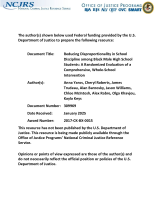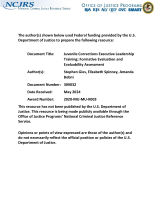Evidence-based practices
Process Evaluation of the Virginia Department of Juvenile Justice’s Regional Service Coordination Model: NIJ Final Report
Reducing Disproportionality in School Discipline among Black Male High School Students: A Randomized Evaluation of a Comprehensive, Whole-School Intervention
Infusing Evidence into Police Reform: Field Initiated Action Research with the Louisville Metro Police Department
Responding to Intimate Partner Violence Related Strangulation Integrating Policy, Practice, and Rese
This webinar examines the problem of Intimate Partner Violence Strangulation and an innovative response policy. The presentation will include an overview of the nature and extent of strangulation, its dangers, and adverse medical consequences followed by a review of a Strangulation Ordinance in Burleson, Texas that mandates extensive training for first responders and a city-wide response protocol for strangulation detection and investigation, documentation of strangulation signs and symptoms, medical assistance, and service referrals for strangulation survivors.
See the YouTube Terms of Service and Google Privacy Policy
Readiness to Implement Evidence-Based Practices in Public Elementary Schools
Celebrating 10 Years of NIJ’s Law Enforcement Advancing Data and Science (LEADS) Scholars Program - 2024 NIJ Research Conference
In 2014, NIJ established the Law Enforcement Advancing Data and Science (LEADS) Scholars Program to support research-minded, mid-career sworn law enforcement officers working to integrate research into agency policy and practice. The LEADS Scholars Program helps participants develop independent research and provides support to identify current evidence on priority issues.
See the YouTube Terms of Service and Google Privacy Policy
Heal Our Youth: A Mixed Methods, Hybrid Effectiveness Implementation Trial for Reducing Community Violence Among Youth in Limited-Opportunity Settings
A Comprehensive Evaluation and Error Rate Assessment of Field Colorimetric Testing for Seized Drugs
Bail, Bias and Bargaining: Investigating Racial Dynamics in Plea Negotiations across Local Court Communities
Quasi-experimental evaluation of contraband interdiction technologies
Building the Capacity of Community-Facing Agencies to Implement Evidence-Based Practices
American Association for the Advancement of Science (AAAS) Science & Technology Policy Fellowships 2024-25
Juvenile Corrections Executive Leadership Training: Formative Evaluation and Evaluability Assessment
From Research to Reality: Recruiting More Women into the Policing Profession: Preliminary Results of an NIJ-funded Applied Research Project
This webinar features the work of Dr. Jen Ranier, a research psychologist who studies workplace and workforce issues at RTI International. The project presented in this webinar had the goal of identifying ways to help law enforcement agencies recruit more women.
See the YouTube Terms of Service and Google Privacy Policy
Webinar Transcript: Fiscal Year 2024 Evaluating Strategies to Advance the Implementation of Evidence-Based Policies and Practices Solicitation
This webinar provided an overview of the NIJ FY 2024 Evaluating Strategies to Advance the Implementation of Evidence-Based Policies and Practices solicitation, in which...





